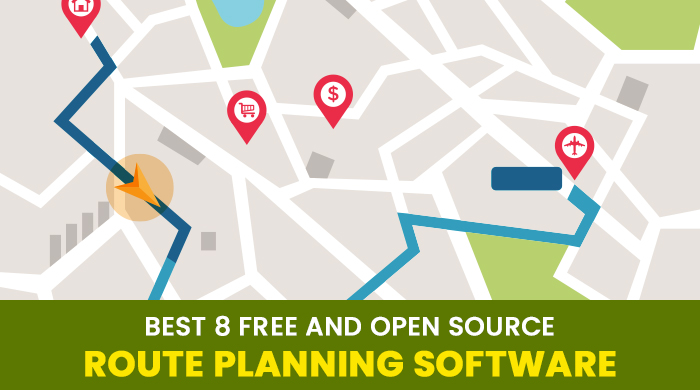Whether it is about navigating to places, tracking an asset, or managing a fleet, the Global Positioning System or the GPS tracking systems have been helping people and businesses to a great extent in terms of conveniently finding and monitoring people, vehicles, assets, objects, and places.
Powered by IoT and cloud technology, GPS tracking systems provide the visibility required to track the location of objects and people and at the same time streamline operations resulting in reduced costs and increased profits. In the current times, GPS is everywhere - in the car, smartphone, and even in your watch. GPS takes you from one place to another without human guidance. GPS can help you locate your equipment in the factory, products in your warehouse, and vehicles in your fleet.
Precisely, the use of GPS tracking systems is critical for every business that requires managing their fleet of vehicles and other assets, as it enables them to solve issues relating to tracking the assets, keeping up the efficiency, adhering to compliance, and safety, and so on. Moreover, many people also use GPS tracking devices to find places, plan road trips, get roadside assistance, and even avoid traffic.
To know more on this topic, let's start with the basic information about GPS tracking technology and gradually move towards understanding the fact that the dominance of this technology in vehicle and asset tracking is only going to increase.
What is a GPS Tracking System?
GPS tracking system is an application that provides real-time updates about the location of the vehicle, person, or object. The GPS tracking application can be integrated into a smartphone or tracking device that allows identifying the vehicle's real-time location or person carrying it.
The GPS tracking system uses satellite signals to determine information about the exact location, speed, movement, and direction of the vehicle or person with a tracking device. To display the location; the GPS tracking system is installed or downloaded in a smartphone or GPS device that is either inbuilt or attached to the vehicles, assets, or objects carried by the people.
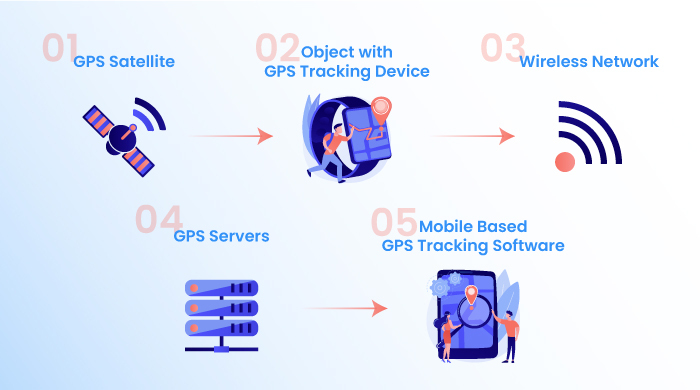
GPS tracking systems can be used for tracking anything, whether it is a pizza joint, cab that is coming to pick you up or a food delivery parcel. This means that GPS technology has penetrated deep into our daily lives. To know more about GPS tracking systems, let's now have a look at how exactly GPS technology works.
How Does GPS Technology Work?
GPS technology is powered by a 30+ network of satellites circling around the globe that help identify the location of an object or person. These satellites have the ability to send out signals continuously. The GPS in phones or any other device can listen to these signals. Based on the signs, the GPS calculates the distance from the satellites and figures out your present location.
GPS can determine where on earth you are within a few meters of your actual location and guide you to places you need to reach by showing you the directions with incredible precision. Many GPS systems are so accurate that they can determine your location within a few inches from your actual location.
Like other technologies, GPS has also evolved a lot to reach where it is today. Let's look at the brief history of GPS technology and then learn about its basic components & different uses and why it is considered the most accurate way of tracking vehicles, assets, and people.
A Brief History of GPS
In ancient times, humans used to look to the skies to pave the way towards their destinations. In those times, sailors used the constellations in the night sky to determine where they were and where they were heading towards. But, now GPS has become an integral part of our lives, and we cannot even imagine a day without it. GPS has made our lives easier by helping us navigate to unknown places and find new destinations, whether it is a food joint, a friend's house, stores or offices.
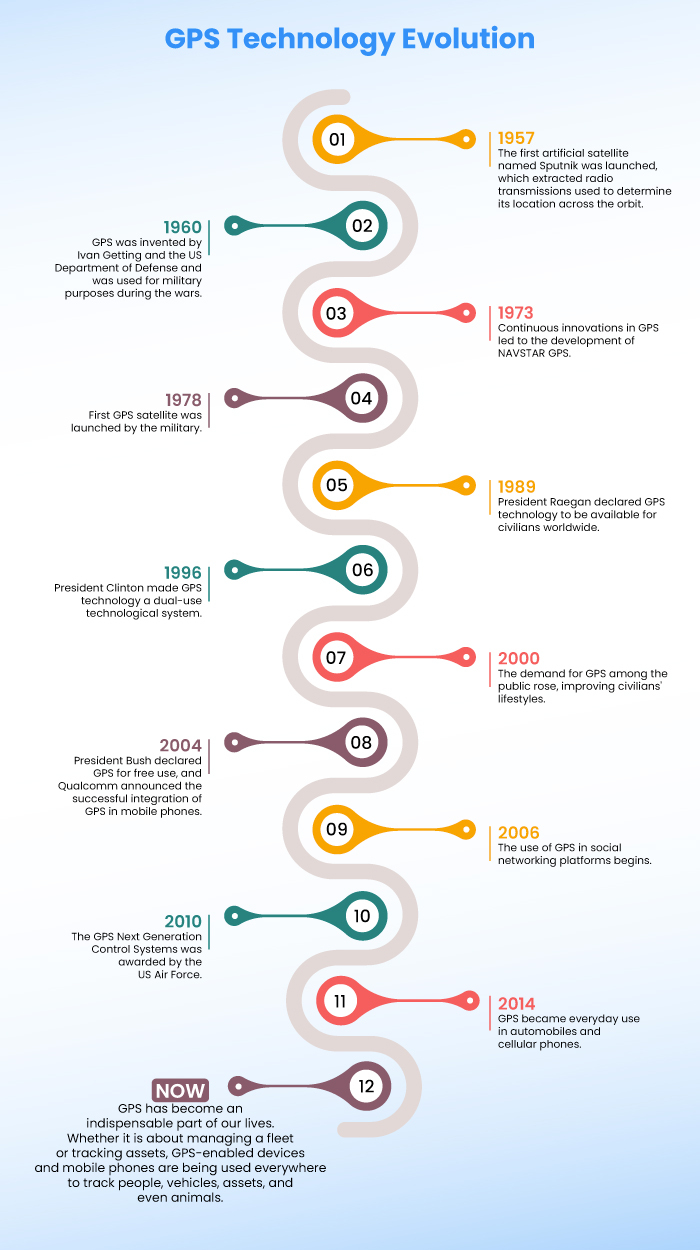
What are the Main Components of GPS Tracking Systems?
![]()
Different Uses of GPS Tracking System
The primary purpose of using a GPS tracker is to locate people, places, vehicles, and assets. These GPS trackers have a lot of unique features that help improve accuracy & efficiency and enhance security. Below-mentioned are the different uses of GPS tracking systems.
Real-time Location Tracking
Whether you need to find the product in a warehouse quickly or locate a vehicle running on the road, a GPS tracking system provides you with real-time information about the location of the object or person carrying the GPS device.
Law Enforcement
For years police have been using GPS devices to track criminals and lawbreakers. Simply by attaching the GPS device to the suspect, the police can access the complete information of their location and try stopping the crime before it occurs.
Military
GPS has become the core navigation system for military aircraft, vehicles, vessels, and personnel. It is being used in the supply delivery on the battlefield, finding weapons, making decisions, and guiding the groups on different missions.
Road Side Support
Whether you face a car breakdown or meet an accident at an unknown place and need roadside support, you can easily share your location information through a GPS device and help emergency crews trace your location and provide assistance easily.
Caring for Mentally Sick and Elders
Many mentally sick and elders have the tendency to wander alone and find it challenging to find the way back home. In that case, GPS devices help locate them easily and help them get back home safely.
Preventing Car Theft
A GPS device is considered to be the most excellent anti-theft device. There have been many instances where a GPS device installed in a car has helped the owners to locate their stolen cars.
Locating Pets
Embedding GPS devices into your pet's skin or collar can help you locate them in case they have been lost or stolen. This helps save the lives of the animals and prevents them from meeting any accident.
Why is GPS Technology Considered as the Most Accurate Way of Tracking?
The GPS tracker gets the signal from the satellites and calculates the distance based on the signal's travel time. These trackers utilize a process known as "Trilateration" to determine the location of the person, vehicle, or asset and also record their movement. This information is then transferred to the central server via a satellite modem attached to the GPS device.
The way GPS technology works is so unique and advanced that it can help analyze the exact location of the object it is attached to up to approximately 10 meters. Moreover, many advanced GPS devices also offer better precision by providing the location around 1 meter of the object it is attached to.
GPS technology is spectacular and considered the most accurate way of tracking because it works based on the signals from the satellite space, which are highly accurate. However, the accuracy of a GPS device also depends on the number of satellites it can detect. The accuracy of the GPS device increases if it detects more satellites.
Among all the other location tracking technologies like beacons, RFID, QR, Wifi, and others, GPS technology provides the maximum signal range, making it the most accurate method of tracking and monitoring locations of people, vehicles, and assets.
![]()
Thus, GPS devices are the tried and tested method that can make your fleet management and asset tracking easier. To prove this fact, let’s have a look at how GPS is different from other location tracking technologies like Bluetooth, Glonass, GIS, RFID, and WLAN.

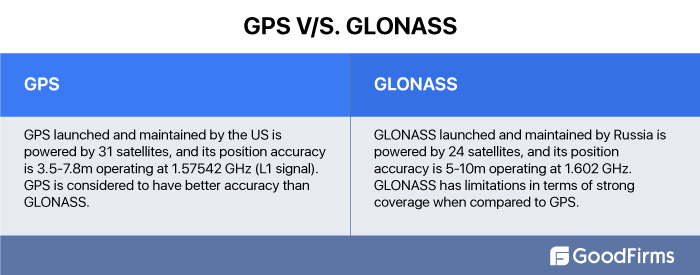
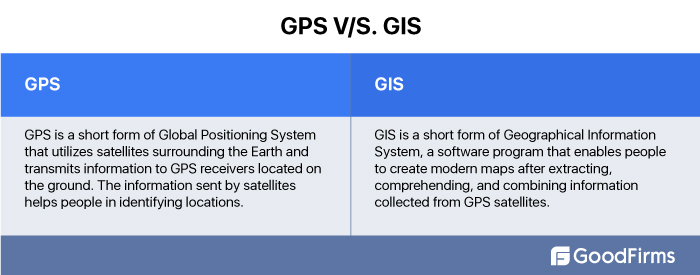
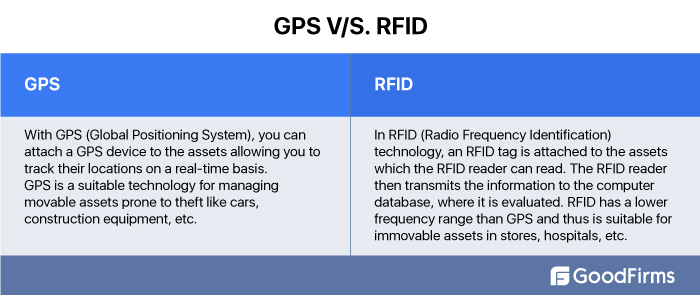
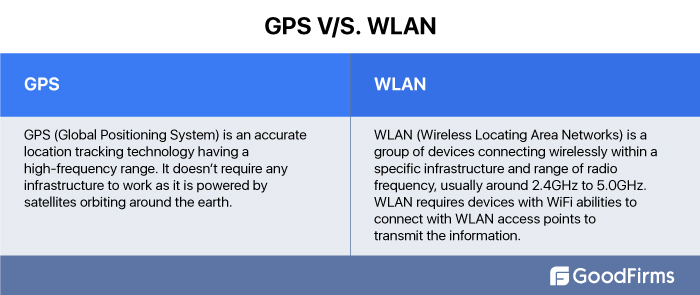
Considering the difference between GPS and other location-tracking technologies, it is clear that GPS can demonstrate the highest reliability when it comes to vehicle and asset tracking.
But, how? Let's look at how GPS software can help fleet management and asset tracking businesses achieve their goals.
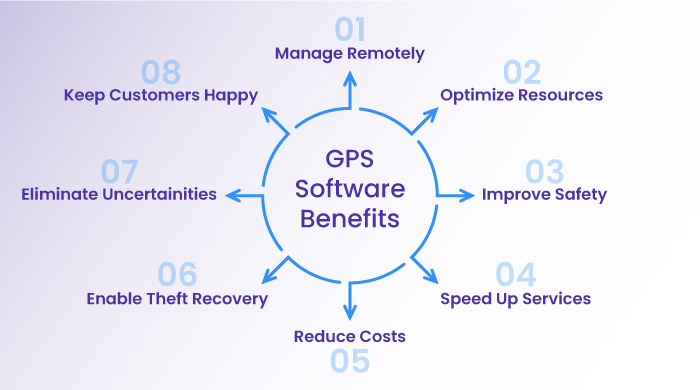
Let's have a look at these benefits below in detail.
Benefits of Using GPS software for Vehicle and Asset Tracking
Manage Remotely
The daily operations for vehicle fleets and asset management can become challenging to manage from a remote location. A GPS tracking system can make that easy for you. The centralized GPS tracking system can help you access the data providing the information about your vehicles and assets scattered across the globe from anywhere and thus helps you manage your business from remote locations.
Optimize Resources
GPS tracking systems enable you to monitor your fleet of vehicles and assets on a real-time basis. It provides you with a detailed view of the fuel consumption of the vehicles, idle drivers, equipment usage, and warehouse space. Based on that information, you can make appropriate decisions relating to resource allocation and identify cost-saving areas.
Improve Safety
Monitoring your fleet of vehicles on a real-time basis helps you improve the safety of your drivers. Moreover, GPS tracking systems can also help you establish two-way communication to prevent accidental incidents that can damage your assets or physically harm your assets and resources.
Speed Up Services
With robust GPS tracking software in place, you can immediately detect the location of vehicles and resources, enabling you to speed up your services, whether it is about delivering a product or providing a ride to the customer.Leveraging prompt and quality services to the customers is the key to the success of any business.
Reduce Costs
The advanced GPS tracking systems available these days are equipped with advanced features that help diagnose even the health and fuel consumption of the vehicles in a fleet. Moreover, it can also help analyze the maintenance requirement of the assets allowing you to make crucial decisions that can save your costs.
Enable Theft Recovery
GPS tracker allows you to monitor the location of your assets and vehicles consistently on a real-time basis. If any of your assets are stolen, you can quickly determine its location and recover its custody. This helps eliminate losses and maintain a good financial position of your business.
Eliminate Uncertainties
These days every customer wants to track their parcel delivery or the ride that is going to pick them up. GPS tracking software helps you keep your customers informed about their ride and product deliveries regularly, eliminating all the uncertainties and keeping them satisfied.
Keep Customers Happy
Delivering timely, prompt, and accurate information and services is the secret behind keeping the customers satisfied and happy. The GPS tracking software helps provide accurate information and timely services to the customers, helping you earn their loyalty and improving the reputation of the business.
Thus, GPS tracking systems have benefitted vehicle and asset tracking businesses to a great extent. With the technology evolving at lightning speed, GPS tracking systems also come with many latest and advanced features to better cater to business needs. As more and more business organizations are discovering the benefits of using GPS tracking software, its future is definitely going to be brilliant and full of opportunities.
Let's have a look at what the future holds for GPS Technology.
The Future of GPS Technology
GPS technology has established itself across various industries around the globe. Moreover, new applications of GPS are emerging every day. Some applications of GPS are quite simple, like locating and determining geographical positions. Moreover, there are other applications wherein GPS is combined with communication and other technologies to develop unique innovations in the business, academic, and public media sectors.
Currently, GPS has become a quintessential element of all the smartphone applications that require detecting locations. For example, online shopping applications detect your location automatically as soon as you download and launch them. The number of subscribers are also increasing for these applications and thus the use of GPS is growing with each passing day.
Thus, to meet this growing demand and stay ahead of the competition, the US Government launched a GPS modernization program in 2000 to improve GPS performance and resistance against atmospheric interference. This modernization program is a continual effort that will end the selective availability of the GPS. Also, the age-old computers and communication systems are being replaced with network-centric computerized applications that allow increased frequency and precise satellite commands that are likely to improve accuracy in GPS technology.
Also, recently there has been increased interest in GPSS (Global Navigation Satellite Systems) observed in the minds of the public. To know more about this technology, let’s have a brief discussion about what GNSS is and how it can influence GPS.
Global Navigation Satellite System (GNSS) - How Can This Influence GPS?
Global Navigation Satellite System, abbreviated as GNSS, is an umbrella term that includes all global satellite positioning systems like GPS invented by the US and GLONASS invented by Russia. It may also include Galileo invented by Europe and Beidou invented by China in the future.
GPS (Global Positioning System) is the subset of GNSS (Global Navigation Satellite System). At present, GPS is the most widely used GNSS globally, which can provide real-time information about the position of the assets, vehicles, and people holding the GPS devices globally under any weather conditions.
Thus, GNSS and GPS collaborate to accomplish the positioning and timing tasks. For example, if the GPS fails due to high-rise buildings or thick forests, GNSS provides the backup of GLONASS to locate the position of assets, people, and vehicles. In the same way, GNSS can power multiple systems simultaneously like GLONASS, Galileo, Beidou, and many more.
As GPS outweighs accuracy from other location and positioning technologies, it has become one of the most popular ones widely used by businesses. But, many businesses are often confused about whether to use vehicle-installed GPS or cellular GPS. Here is a brief information that can help you decide which option would suit your business organization best and help achieve your goals.
Can Cellular GPS Be Better Than Vehicle Installed GPS?
Cellular GPS and vehicle-installed GPS might sound similar, but the difference between them lies in what exactly you are trying to track. Cellular GPS enables you to track your driver's cell phone, whereas vehicle-installed GPS allows you to not only track your vehicle's location but also provides you the information about its fuel consumption, speed, and driver's behavior.
Let's go through the comparison between the cellular GPS and vehicle-installed GPS to determine the best that suits your business needs.

This comparison shows that cellular GPS can be better than vehicle-installed GPS if budget is limited and quick setup is required. But, if you require tracking fuel usage, driving behavior, and the actual physical location of your vehicle or asset on a real-time basis, a vehicle-installed GPS would be the right choice for you.
As the technology evolves, GPS tracking software promises to better cater to your tracking needs now and in the future. Let's look at the latest trends that are shaping the future of GPS tracking technology and making it smarter with each passing day.
Latest Trends in GPS Tracking Technology
GPS III
GPS III is a satellite tracking system designed, manufactured, and launched for the United States Air Force. It can help GPS tracking systems to have three times better accuracy. Also, it can enable the current GPS systems to be more powerful and overcome atmospheric interference. The goal of GPS III-enabled systems is to provide better accuracy and enhanced signal reliability.
Telematics
Telematics is an excellent blend of telecommunications and informatics using GPS technology. It is all about integrating an intelligent device in your vehicle that reports every detail, whether speed, fuel use, driver habits, tire pressure, idling, etc. Telematics can help you collect real-time data about the location and status of the vehicle. This can enable you to manage your fleet of cars accurately and efficiently, resulting in customer satisfaction and business growth.
Video Telematics
Video telematics refers to a technology that integrates cameras with GPS to record and display real-time accident or collision instances. It is used to collect the evidence in the form of video footage and transmit it to a cellular network on a real-time basis. This latest trend in GPS technology has been helpful in keeping track of the drivers’ behavior and saving businesses from financial losses.
Artificial Intelligence
GPS tracking systems can navigate you to places via different routes. But, how many times have you compared two different routes in terms of miles, traffic, and fuel consumption? You might forget to do so. AI-enabled GPS tracking systems do that automatically for you and take you to the most convenient and time-saving route. As AI enables GPS tracking systems to learn from the past, it can intelligently choose the best route for you.
API Integrations
Although the majority of the businesses in fleet and asset management use the best GPS tracking software, many of them might require customized features specific to their industry. As API integrations make the entire data and functionality available under a single interface, it ultimately helps in saving time, automating tasks, improving productivity, increasing operational efficiency, enhancing customer experiences, and reducing wastage.
Geofencing
Geofencing helps you detect the abnormalities in the routes of your fleet vehicles and stolen assets. As soon as a particular vehicle or object goes beyond a specific location, the geofencing-enabled GPS tracking system immediately sends you a notification so that you can take necessary action immediately and stop unforeseen situations from happening. This can save your business from financial losses and ensure smooth operations.
Data Encryption
Security becomes a prime concern when it comes to tracking a person, vehicle, or assets. The information about the location of the same can be misused if accessed by unauthorized users. Data encryption plays a major role here. It is a security method where information is encoded and is allowed to be accessed by the person possessing the correct encryption key. This functionality in GPS systems is extremely important as the crucial information can be a financial loss for the business if accessed by hackers.
Voice Recognition
The voice recognition feature enables you to control your GPS with your voice. No more getting your hands off your steering wheel to manage your GPS device is required. The voice recognition enabled GPS tracking software allows drivers to navigate to their destinations simply by talking to the system. The voice-enabled GPS system becomes essentially useful when there is a change in the itinerary or any other emergency.
So, these latest trends have improved the GPS tracking systems and thus are being adopted by different business sectors requiring accurate fleet and asset management. Moreover, the need to provide the best traveling experience to the customers and prevent losses due to stolen assets have encouraged many companies to implement advanced GPS tracking systems into their business. These improvements in GPS tracking systems have become the driving force behind its growth.
GPS Tracking Device Market Growth
As per a recent Market Research report, GPS Tracking Device Market worth USD 1.78 Billion in 2020 is likely to reach USD 4.93 Billion by 2028. This growth accounts for a CAGR of 12.3% from 2021 to 2028.
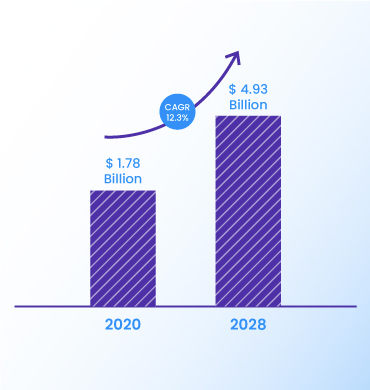
Conclusion
GPS is almost everywhere and has become an indispensable part of our lives. GPS has been here for so many decades now, and its journey has been quite progressive in terms of new innovations and developments. Artificial Intelligence (AI), IoT (Internet of Things), voice recognition, and many other emerging technologies have enhanced the facilities, and functionalities of the GPS systems.
With the growing innovations in GPS tracking devices, there are new developments in GPS tracking software, too, which can help you expand your business horizons. GPS is not only used for tracking locations but also includes voice assistants, analytical abilities, reminders, reporting, and many more that better cater to your business needs. As more and more businesses are incorporating GPS technology into their daily operations and improving their performance, its dominance in vehicle and asset tracking is only going to increase consistently.
So, whether you are looking to grow your fleet management business or wish to track your valuable assets, an accurate GPS system becomes an integral requirement to optimize your operations efficiently, improve productivity and reduce wastages. If you are planning to implement a GPS tracking solution within your business, this comprehensive list of the best GPS tracking software can help you pick the most suitable one that meets your business requirements and budget.

